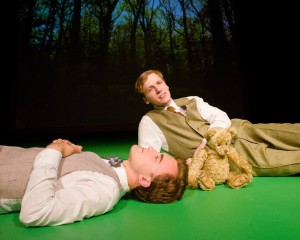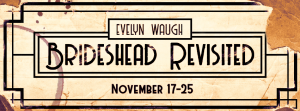In its obituary The Times opined that Evelyn Waugh “developed a wickedly hilarious, yet fundamentally religious assault on a century that, in his opinion, had ripped up the nourishing taproot of tradition, and let wither all the dear things of the world.” In this week where our populace voted Yes to legalising gay marriage (but which has been promoted bizarrely as a ‘vote for love’) it is interesting, but equally as challenging, to compare the worlds of Brideshead Revisited and ours – seemingly gay love could be expressed but accepted then by the lords of religion but today they are forced to publicly accept its legitimacy. In this context, what would Waugh have made of the last five or ten years of political correctness when reflecting on their influence on the “nourishing taproot of tradition.”
 It is also interesting to note the similarities in the style of this work with Fitzgerald’s Great Gatsby which IT also brought to the stage now three years ago. Then and as here a narrator, in both theatrical instances played brilliantly by Will Cox, is involved and mostly dominates each scene yet is not the actual subject of the stories. Yet, both show love is not easily found and is often ruined by those things that many may consider facilitating forces, grease for amorous wheels – money in the former and the church in this.
It is also interesting to note the similarities in the style of this work with Fitzgerald’s Great Gatsby which IT also brought to the stage now three years ago. Then and as here a narrator, in both theatrical instances played brilliantly by Will Cox, is involved and mostly dominates each scene yet is not the actual subject of the stories. Yet, both show love is not easily found and is often ruined by those things that many may consider facilitating forces, grease for amorous wheels – money in the former and the church in this.
Cox’s Charles Ryder happens upon Sebastian Flyte (Ben Francis) in their first weeks at Oxford and the first half is about their friendship – its formation and demolition. Director Rob Croser gives their love full bottle with kissing, touching and partial nudity that leaves none in any confusion as to its composition. This contrasts with his direction in their production of Ross 12 months ago where the punches pulled tended (in the view of this reviewer) to emasculate the force of the whole.
It is perhaps interesting to further contrast this with the fully suggestive but more inhibited body language used in the seminal Brideshead TV production of the 1980s which treatment, of course, may have been more about network directive with an eye to a mid-evening audience than to director’s choice.
The second half delves into the relationship of Charles and Julia with all its symbolism and the creeping then dominate role of the Church in life, love and everything in between.
One of the features of this IT work is Rob Croser and David Roach’s stage with its quite brilliant use (for a suburban theatre company) of a transparent screen onto which locations were projected, yet also enabling reflections and memories of the various players behind it. Notwithstanding the richness of the possibilities provided and taken up by Croser as driector, the stage props are then mostly limited to two long stools. Where less is more, we are provided with riches. The use of the forward sloping stage added to the impact of the design.
As mentioned Will Cox is in great form. Ben Francis shows his Private Peaceful (from April) was no flash in the pan though perhaps here his character’s angst is better achieved than the joys of his salad days with Charles. Paul Reichstein gives great definition to his varied characters, achieving the trans-Pacific brashness of his Rex Mottram every bit as well as the self-indulgent flamboyance of his Anthony Blanche. David Roach perhaps did not achieve quite that success in his roles though, for sure, he delivered much merriment as Charles’s father. Lyn Wilson was a compelling Lady Marchmain and Madeline Herd did what she could with her material, though at times it all seemed a bit rushed.
As always ambitious, but with Rob Croser and Will Cox at the helm off and on stage respectively, IT once again delivers commendable theatre.
Kryztoff Rating 3.5K



Recent Comments